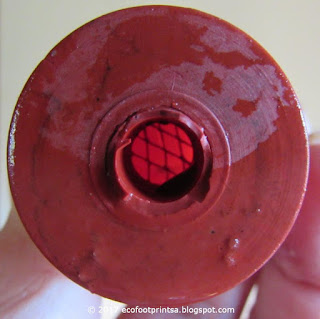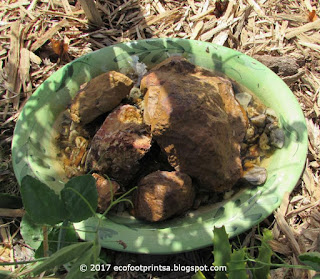When we moved to our smallholding at the end of June 2012 there were about 16-odd permanent residents and 5-odd weekenders. Since then that figure has grown to 37 permanent residents and 11-odd weekenders. Additionally, our valley water supply from that one distribution point on the N2 is further distributed, via (unsecured / unlocked) 5 000lt tanks placed strategically around the valley, and, as newcomers purchase their smallholding, and request a water connection, the main valley supply pipe is again severed in order to connect their individual water meter.
All these breaks in the line - whether accidental or intentional - invariably result in foreign matter / contamination entering our water supply.
Both these situations have concerned RMan and I.
We have made alternative arrangements so that we, personally, are more water secure - through our 5 000lt potable water tank, and our 8 X 5 000lt rain water tanks.
But, the tank vulnerability and "foreign matter" still concerned us. Finally, last week I asked RMan if we could get a combined early Christmas present, and take steps to mitigate that potential problem.
All these breaks in the line - whether accidental or intentional - invariably result in foreign matter / contamination entering our water supply.
Both these situations have concerned RMan and I.
We have made alternative arrangements so that we, personally, are more water secure - through our 5 000lt potable water tank, and our 8 X 5 000lt rain water tanks.
But, the tank vulnerability and "foreign matter" still concerned us. Finally, last week I asked RMan if we could get a combined early Christmas present, and take steps to mitigate that potential problem.
 |
| Travel Berkey |
The farmers round us spray glycophosphates on their land, which obviously, as is the nature of a spray, lands on our roof. Our rainwater will thus probably be contaminated too. But "Black Berkey® Purification Elements will reduce Glyphosate in your water by greater than 75%, exceeding the laboratories reporting limits."
Yes, it is quite an expensive purchase, but the filters will last for 6 000 gallons or 22 600ltrs or - not being spring chickens anymore - they will probably the rest of our lives 😉
And then one of our kids can inherit the system. 😁
Personally, I'm very relieved, because this system will not only provide clean drinking water for us now, but will also allow us to filter our rain water, and even our muddy dam water, if necessary at any time in the future. Providing the dam is still holding water though...
--------------------------------------------------------
After I had concluded our purchase, I wrote to the local supplier, Riaan, (http://www.water-purifier.co.za/) and asked him is he would be prepared to sponsor a Berkey to a member of a Facebook Group to which I belong. He very generously has said that he will. So, for all of you who have a Facebook presence, please, if you live in the Western Cape, join both the Western Cape group
https://www.facebook.com/groups/watersheddingsa/ and the main watchdog group
https://www.facebook.com/groups/924585607595490/
In order to make yourselves eligible to enter and win this brilliant giveaway.
Those Facebook groups are doing sterling work at assisting everyone to survive the current drought - through sharing important notices from the authorities, and through allowing everyone to pose questions / get answers / share hints and tips from the general public, as well as giveaways such as this. Please - there are various other groups in other provinces - join your area's group here:
Free State: https://www.facebook.com/groups/1104758469627319/
Gauteng: https://www.facebook.com/groups/1409690155743938/
Kwazulu Natal: https://www.facebook.com/groups/512238275796563/
Mmpumalanga: https://www.facebook.com/groups/128995167833468/
The Facebook page Admins will be advertising the giveaway shortly.
Finally, if you think it won't happen to you, on Thursday this week the following notice was issued by the Western Cape authorities / government:
South Africa - the whole country - is predicted to be hit hard - very hard - by the effects of climate change / global warming. As with the assistance that farmers are getting from other farmers for feeding their drought affected animals, through helping each other on these groups we will all weather the situation far better by joining our mutual resources / information.
Postscript: I paid in full for my Berkey. However, I did tell the local distributor, Riaan, that I would mention his company by way of thanking him for his generosity in accepting the giveaway request from a total stranger - me - and for his generosity to the winner of his giveaway. Please - visit his website and check out the range of Berkey's. Perhaps one will suit your pocket 😏























